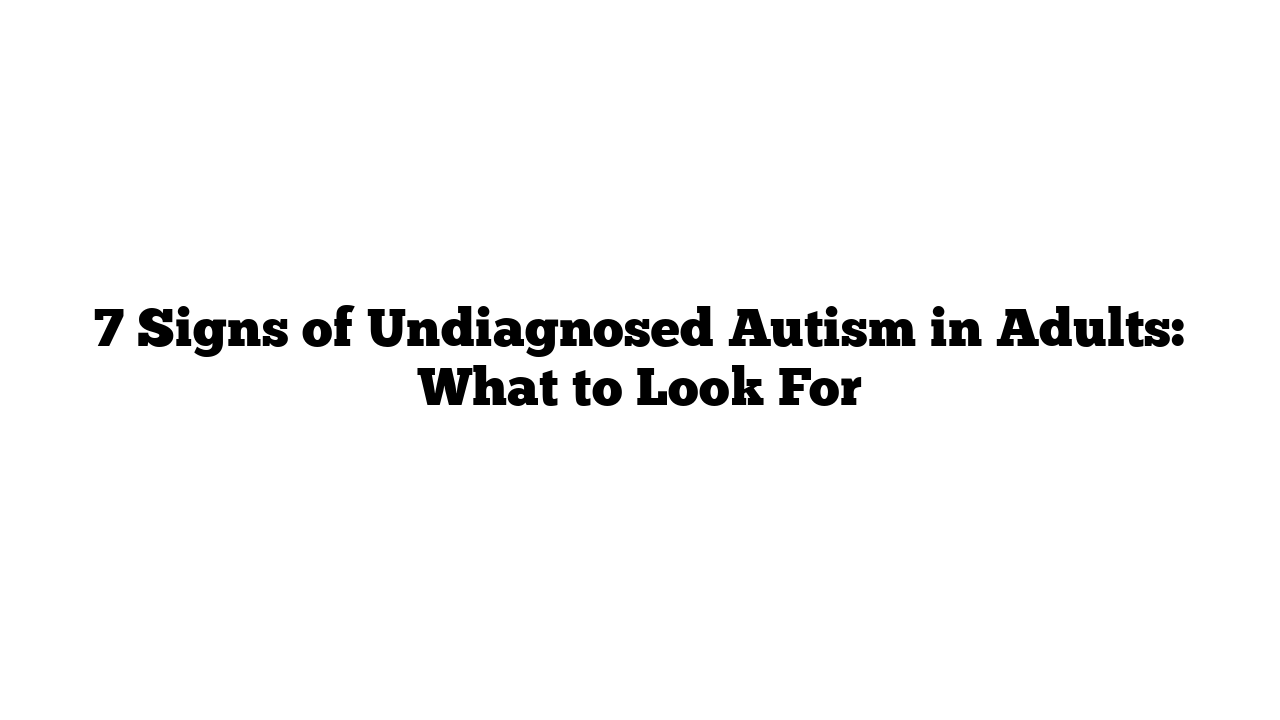Autism is more commonly diagnosed in children today, with many classrooms having one or more autistic children. But what about adults? Undiagnosed autism in adults is more prevalent than you might think. In fact, if certain adults were children today, they’d likely receive a diagnosis. So, how do you spot autism in adults?
In this article, we’ll explore seven signs of undiagnosed autism in adults, helping you recognize autism traits that may have been overlooked. Whether you or someone you know fits these patterns, recognizing these signs can lead to a better understanding of how autism affects adults.
1. Challenges with Social Interactions
One of the most prominent signs of undiagnosed autism is difficulty with social interactions. Many autistic adults struggle to intuitively understand social cues and conventions, which can make interactions exhausting. You might find it hard to know how to behave in social situations, making it feel like you’re constantly trying to catch up.
This challenge often leads to avoiding social situations or coming across as socially awkward. In some cases, individuals may abandon social norms altogether, embracing an eccentric or unique persona. These behaviors point to a difficulty in fitting in and understanding how others engage with each other.
2. Need for Routine and Structure
Another sign of undiagnosed autism in adults is a strong need for structure and routine. Whether you appear highly organized or chaotic and disorganized, both extremes may stem from the same issue. Autistic individuals often rely on routines as a coping mechanism to manage executive function difficulties.
Disruptions to your routine can make it challenging to concentrate or prioritize, leading to disorganization. While some might seem overly rigid, others might appear disorganized and unpredictable. Both extremes can indicate the same internal struggle.
3. Sensory Sensitivities and Insensitivities
Autism often comes with sensory sensitivities or insensitivities. While most people think of heightened sensitivity to light, sound, or textures, sensory differences go beyond that. They can include varying levels of pain tolerance, temperature regulation, and even coordination challenges.
For example, an individual may find certain smells overwhelming or have a high pain tolerance, which can cause them to push through discomfort without noticing the impact. Sensory sensitivities, such as clumsiness, might be mistaken for something else, but they are often linked to autism. If you experience sensory processing issues that differ significantly from those around you, this could be a key indicator.
4. Spiky Skill Sets
A common characteristic of autism in adults is a “spiky” skill set—being highly skilled in some areas but struggling in others. For example, someone might excel in a specific hobby or profession, such as playing table tennis, but find basic everyday tasks challenging, like remembering birthdays or reading a map.
Autistic individuals often excel in specific skills or areas of focus while having gaps in others. These discrepancies between abilities can make everyday tasks more difficult. Recognizing these “spiky” skill sets can help identify undiagnosed autism.
5. Emotional Regulation: Meltdowns, Shutdowns, and Withdrawal
Autistic adults often experience emotional regulation challenges, such as meltdowns, shutdowns, or withdrawal. When faced with overwhelming stimuli, these individuals might have intense emotional reactions, withdraw socially, or mentally shut down as a coping mechanism.
These behaviors can appear suddenly, leaving friends or loved ones puzzled by the emotional fluctuations. For example, someone might engage in conversations normally and then suddenly retreat when feeling overwhelmed. This can lead to confusion in relationships and is often a sign of autism.
6. Unusual Associations and Mental Jumps
Autistic individuals frequently make unusual associations or mental leaps that others might find puzzling. For example, they might say “banana,” and the response could be “space station.” These unexpected connections, while creative, can make communication difficult because they may not align with others’ thought processes.
If you often experience a different way of thinking—where your brain jumps from one idea to an unrelated one—it could be a sign of undiagnosed autism. These unusual mental connections can also influence how a person perceives the world, sometimes making them feel out of sync with others.
7. Just a Bit Different
The final sign of undiagnosed autism might be the hardest to pinpoint but is often the most telling: the person is simply different. This might manifest as quirky behaviors, preferences, or ways of thinking that set someone apart from the crowd.
Being the “odd one out” in various situations can indicate autism, particularly if it happens frequently. While this might not necessarily mean someone is autistic, if you notice a recurring pattern of being different in multiple settings, it’s worth considering autism as a possibility.
Conclusion: Understanding Autism in Adults
These seven signs are not exhaustive, but they offer valuable insight into the behaviors and traits that might indicate autism in adults. Recognizing these signs early can lead to better self-understanding and support.
If you find that these traits resonate with you or someone you know, reaching out to a healthcare professional for further evaluation could provide clarity.
FAQs:
- Can autism be diagnosed in adults? Yes, autism can be diagnosed in adults. Many people remain undiagnosed until later in life, especially if their traits were not as recognizable when they were younger.
- What should I do if I think I might be autistic? If you suspect that you might be autistic, it’s important to seek guidance from a healthcare provider. A professional evaluation can help determine if autism is a factor.
- How do sensory sensitivities affect daily life? Sensory sensitivities can make certain environments overwhelming. Sounds, smells, and textures that others might not notice can feel intense for someone with autism, affecting their daily routines.
For more resources on autism and to learn more about its impact on adults, visit trusted websites like medicaltimes.io, Autism Speaks, or The National Autistic Society.
autism in adults, undiagnosed autism, social challenges, sensory sensitivities, emotional regulation, autism traits
